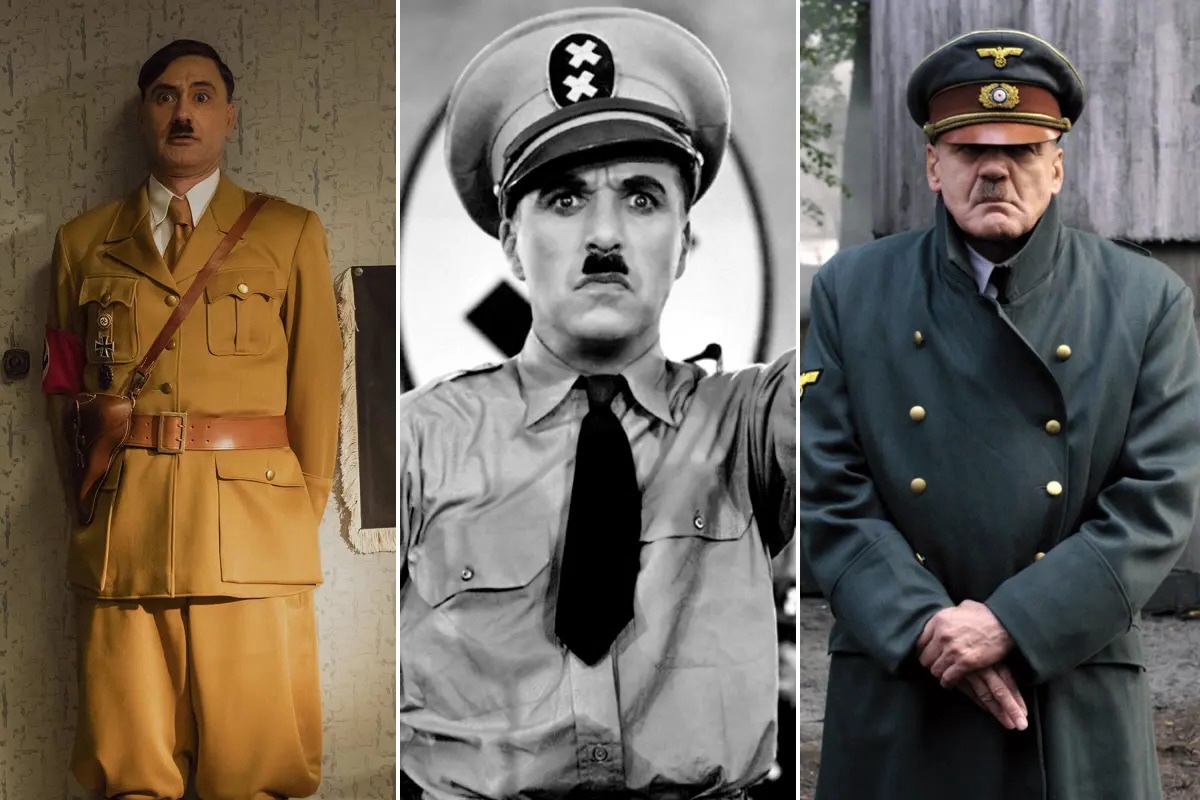
Why are Hitler movies so captivating? These films offer a gripping look into one of history's darkest periods, blending drama, horror, and historical accuracy. Hitler movies often explore the complexities of human nature, power, and morality. They provide a lens through which we can examine the impact of totalitarian regimes and the resilience of the human spirit. From intense war dramas to thought-provoking documentaries, these films serve as powerful reminders of the past. Whether you're a history buff or a movie enthusiast, the stories told in Hitler movies are both educational and emotionally stirring. Ready to dive into 38 intriguing facts about these compelling films? Let's get started!
Key Takeaways:
- Hitler movies cover a wide range of genres, from historical dramas to satirical comedies, offering unique perspectives on one of history's most infamous figures.
- These films explore Hitler's life and impact through different lenses, including documentaries, biographical films, alternate history, and even animated features, providing diverse and thought-provoking perspectives.
Hitler Movies: A Fascinating Genre
Movies about Adolf Hitler have captivated audiences for decades. These films range from historical dramas to satirical comedies, each offering a unique perspective on one of history's most infamous figures. Here are some intriguing facts about Hitler movies.
Historical Dramas
Historical dramas aim to depict real events with accuracy and depth. They often explore Hitler's rise to power and the impact of his regime.
-
"Downfall" (2004) is one of the most acclaimed Hitler movies. This German film portrays the final days of Hitler's life in his Berlin bunker. Actor Bruno Ganz's performance as Hitler received widespread praise for its authenticity.
-
"Hitler: The Rise of Evil" (2003) is a miniseries that chronicles Hitler's early years. Starring Robert Carlyle, it delves into his transformation from a failed artist to the leader of the Nazi Party.
-
"Valkyrie" (2008) focuses on the 1944 assassination attempt on Hitler. Tom Cruise stars as Colonel Claus von Stauffenberg, who led the plot to kill Hitler and overthrow the Nazi regime.
-
"The Bunker" (1981) offers a detailed look at Hitler's last days. This made-for-TV movie features Anthony Hopkins as Hitler, providing a chilling portrayal of his final moments.
Satirical Comedies
Satirical comedies use humor to critique and analyze Hitler's actions and ideology. These films often blend historical facts with fictional elements to deliver their message.
-
"The Great Dictator" (1940) is a classic satire by Charlie Chaplin. Chaplin plays both a Jewish barber and a dictator resembling Hitler, using humor to condemn fascism and anti-Semitism.
-
"Jojo Rabbit" (2019) is a dark comedy that reimagines Hitler as a child's imaginary friend. Directed by Taika Waititi, who also plays Hitler, the film explores themes of indoctrination and innocence.
-
"Look Who's Back" (2015) imagines Hitler waking up in modern-day Germany. This German film, based on a bestselling novel, uses satire to examine contemporary society's reaction to Hitler's return.
-
"To Be or Not to Be" (1942) is a comedy about a theater troupe in Nazi-occupied Poland. Directed by Ernst Lubitsch, the film features a bumbling Hitler impersonator and clever anti-Nazi humor.
Documentaries
Documentaries provide factual accounts of Hitler's life and the atrocities committed during his regime. They often include interviews, archival footage, and expert analysis.
-
"Hitler: A Career" (1977) is a comprehensive documentary on Hitler's rise to power. It uses rare footage and photographs to trace his path from obscurity to dictator.
-
"The World at War" (1973) is a landmark documentary series that covers World War II. Narrated by Laurence Olivier, it includes extensive coverage of Hitler's role in the conflict.
-
"Hitler's Children" (2011) examines the lives of Hitler's descendants. This documentary explores how the relatives of top Nazi officials cope with their family's dark legacy.
-
"The Architecture of Doom" (1989) looks at the aesthetic aspects of Nazi ideology. It delves into Hitler's obsession with art and architecture, revealing how these elements were used for propaganda.
Biographical Films
Biographical films focus on specific aspects of Hitler's life, providing a more personal look at the man behind the atrocities.
-
"Max" (2002) imagines a friendship between Hitler and a Jewish art dealer. Starring John Cusack and Noah Taylor, the film explores how Hitler's artistic ambitions influenced his political ideology.
-
"Mein Kampf" (2010) is a German film that dramatizes Hitler's early years in Vienna. It portrays his struggles as an aspiring artist and his growing anti-Semitic beliefs.
-
"Hitler: The Last Ten Days" (1973) stars Alec Guinness as Hitler. This film focuses on the final days of Hitler's life, offering a psychological portrait of his descent into madness.
-
"The Man Who Crossed Hitler" (2011) tells the story of a Jewish lawyer who challenged Hitler in court. This British TV movie highlights the legal battle that could have changed history.
Alternate History
Alternate history films imagine different outcomes for Hitler and the Nazi regime. These speculative stories often explore "what if" scenarios.
-
"Inglourious Basterds" (2009) is a Quentin Tarantino film that reimagines World War II. It features a plot to assassinate Hitler, blending historical events with fictional characters.
-
"Fatherland" (1994) is set in a world where Nazi Germany won World War II. This TV movie, based on a novel by Robert Harris, follows a detective uncovering a conspiracy in the 1960s.
-
"The Man in the High Castle" (2015-2019) is a TV series based on Philip K. Dick's novel. It depicts an alternate reality where the Axis powers won the war, with Hitler still in power.
-
"Iron Sky" (2012) is a sci-fi comedy about Nazis on the moon. This Finnish film imagines a secret Nazi base on the moon, planning a return to Earth.
Controversial Films
Some Hitler movies have sparked controversy due to their subject matter or portrayal of historical events. These films often provoke strong reactions and debates.
-
"Triumph of the Will" (1935) is a propaganda film directed by Leni Riefenstahl. Commissioned by Hitler, it glorifies the Nazi Party and remains controversial for its artistic merit and political message.
-
"Hitler: The Last Ten Days" (1973) faced criticism for its sympathetic portrayal of Hitler. Despite Alec Guinness's acclaimed performance, some viewers felt the film humanized Hitler too much.
-
"The Day Hitler Died" (2016) is a documentary that includes graphic details of Hitler's suicide. Some critics argued that the film's explicit content was unnecessary and sensationalist.
-
"Hitler: A Film from Germany" (1977) is an avant-garde film that challenges traditional narratives. Directed by Hans-Jürgen Syberberg, it uses surreal imagery and unconventional storytelling to explore Hitler's impact on German culture.
Lesser-Known Films
While some Hitler movies are well-known, others have flown under the radar. These lesser-known films offer unique perspectives on Hitler and his era.
-
"The Empty Mirror" (1996) imagines Hitler reflecting on his life in a post-war bunker. This experimental film blends historical footage with fictional monologues.
-
"My Führer" (2007) is a German comedy about Hitler's final days. Directed by Dani Levy, it portrays Hitler as a bumbling figure, contrasting with his usual depiction.
-
"The Beloved" (2011) is a Russian film that explores Hitler's relationships with women. It delves into his personal life, focusing on his interactions with Eva Braun and other women.
-
"Hitler's SS: Portrait in Evil" (1985) is a TV movie about two brothers in the SS. It examines their differing paths within the Nazi regime and their eventual disillusionment.
Animated Films
Animated films about Hitler are rare but offer a unique medium to explore his story. These films often use animation to convey complex themes and emotions.
-
"Waltz with Bashir" (2008) is an animated documentary that includes references to Hitler. While primarily about the Lebanon War, it draws parallels between the Holocaust and modern conflicts.
-
"The Tragedy of Man" (2011) is a Hungarian animated film that features Hitler. It spans different historical periods, including a segment on World War II and Hitler's rise.
-
"Adolf Hitler: My Part in His Downfall" (1973) is a British animated film. Based on Spike Milligan's memoir, it uses humor and animation to depict his experiences during the war.
Parodies and Spoofs
Parodies and spoofs often exaggerate or mock Hitler's persona, providing a humorous take on a dark subject. These films use comedy to critique and entertain.
-
"The Producers" (1967) is a classic comedy about a Broadway musical called "Springtime for Hitler." Directed by Mel Brooks, it features a hilarious portrayal of Hitler and his followers.
-
"Hitler: Dead or Alive" (1942) is a wartime comedy about a plot to capture Hitler. This B-movie uses absurd humor to depict a group of Americans trying to kidnap Hitler.
-
"Heil Honey I'm Home!" (1990) is a controversial British sitcom pilot. It parodies American sitcoms by imagining Hitler and Eva Braun as a suburban couple.
International Perspectives
Hitler movies are not limited to Hollywood. Filmmakers from around the world have tackled the subject, offering diverse perspectives.
-
"The Last Train" (2006) is a German film about Jews being deported to Auschwitz. It includes a subplot involving Hitler, highlighting the broader impact of his policies.
-
"Amen." (2002) is a French-German film about a Nazi officer who tries to expose the Holocaust. Directed by Costa-Gavras, it examines the moral dilemmas faced by those within the regime.
-
"The Ogre" (1996) is a French-German film about a man who becomes a Nazi officer. Starring John Malkovich, it explores his transformation and eventual disillusionment.
-
"The Tin Drum" (1979) is a German film that includes a surreal portrayal of Hitler. Based on Günter Grass's novel, it uses magical realism to depict life under the Nazi regime.
Final Thoughts on Hitler Movies
Hitler movies offer a unique lens into one of history's darkest periods. They provide not just entertainment but also education, shedding light on the complexities of World War II and the Holocaust. From gripping dramas to thought-provoking documentaries, these films help us understand the impact of Hitler's regime. They remind us of the importance of remembering history to avoid repeating its mistakes. Whether you're a history buff or just curious, watching these movies can be a powerful experience. They challenge us to reflect on human nature, morality, and the consequences of unchecked power. So next time you're looking for a film, consider diving into one of these impactful stories. You'll gain more than just a few hours of entertainment; you'll walk away with a deeper understanding of our past.
Frequently Asked Questions
Was this page helpful?
Our commitment to delivering trustworthy and engaging content is at the heart of what we do. Each fact on our site is contributed by real users like you, bringing a wealth of diverse insights and information. To ensure the highest standards of accuracy and reliability, our dedicated editors meticulously review each submission. This process guarantees that the facts we share are not only fascinating but also credible. Trust in our commitment to quality and authenticity as you explore and learn with us.


